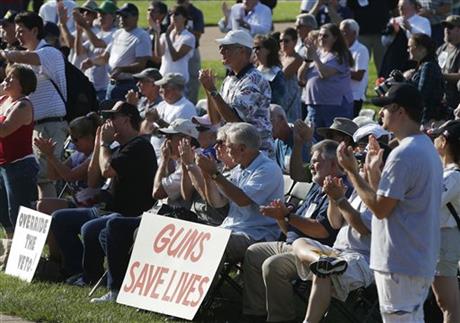
By DAVID A. LIEB
Participants applaud during a rally to override Gov. Jay Nixon’s veto of a gun bill on the south lawn of the Missouri State Capital in Jefferson City, Mo., Wednesday, Sept. 11, 2013. The governor vetoed a bill that attempted to nullify certain federal gun laws. (AP Photo/Orlin Wagner)
JEFFERSON CITY, Mo. (AP) — Missouri lawmakers were deciding Wednesday whether to take the first shot in a potential legal battle with the federal government by enacting a measure that threatens criminal charges against federal agents who attempt to enforce certain gun-control laws.
The Republican-led Legislature was considering whether to override a veto of the legislation by Democratic Gov. Jay Nixon, who asserts that it would violate the U.S. Constitution. The gun bill was one of the most high-profile of Nixon’s 33 vetoes, which also include a bill cutting state income taxes.
The House fell significantly short of the two-thirds majority needed to override the tax cut, but debate was continuing Wednesday on other measures.
The Missouri gun legislation is one of the boldest examples yet of what has become a nationwide movement among states to nullify or ignore federal laws with which local officials disagree. A recent Associated Press analysis found that about four-fifths of the states have enacted laws that directly reject or conflict with federal laws on marijuana use, gun control, health insurance requirements and identification standards for driver’s licenses.

The latest Missouri measure would declare invalid any federal policies that “infringe on the people’s right to keep and bear arms.” Federal authorities who attempt to enforce those laws could face state misdemeanor charges punishable by up to a year in jail and a $1,000 fine. Similar penalties would apply to anyone who publishes identifying information about gun owners.
Nixon vetoed the bill because he said it infringed on First Amendment free speech rights and also violated the supremacy clause of the U.S. Constitution, which gives precedence to federal laws over conflicting state ones.
Missouri Attorney General Chris Koster, a Democrat, also raised concerns last week about the ramifications of a potential veto override. He said a court likely would strike down the nullification provision but could leave intact other sections of the bill that could potentially prevent local police from cooperating with federal authorities on crimes involving guns. He said the bill also could open Missouri police to potential lawsuits from criminals if they refer gun-related cases to federal authorities.
The Brady Center to Prevent Gun Violence said Wednesday that it will immediately file a federal lawsuit against the Missouri measure if the veto override succeeds.
“This outrageous law would allow criminals to buy machines guns, and make federal law enforcement officers into criminals for trying to stop gun crimes,” Jonathan Lowy, director of the Brady Center’s legal action project, said in a written statement.
A couple hundred gun rights advocates rallied Wednesday on the Missouri Capitol lawn in a last-moment lobbying push for the bill.
“We need to take control from the federal government and their overreach of taking away our rights,” said Gene Dultz, 60, of St. Louis, who was wearing a National Rifle Association hat and shirt while standing in the crowd.
The National Rifle Association has maintained a conspicuous public silence about the bill, declining to answer repeated questions from the media about whether it supports or opposes the measure.
The bill’s sponsor, Rep. Doug Funderburk, R-St. Peters, said he’s confident of getting the two-thirds majority needed for an override in the House but is concerned about the bill’s prospects in the Senate. Earlier this week, Senate Majority Leader Ron Richard, R-Joplin, said he was switching from a “yes” to a “no” because of unease about the constitutionality of the legislation.
“Because of fear that was mongered in the last hour, there are some people who are getting serious concerns,” Funderburk told rally participants while encouraging them to relentlessly lobby lawmakers in the final moments before a vote.
One of the specific federal laws that the Missouri nullification bill cites is the Gun Control Act of 1934, which imposed a tax on transferring machine guns or silencers. The bill also would invalidate any federal law requiring fees, tracking or registration of firearms or ammunition that “could have a chilling effect on the purchase or ownership of those items by law-abiding citizens.”
If the veto override succeeds, the Missouri Press Association also has said it will file a lawsuit challenging the constitutionality of the provisions barring the publication of the name, address or other identifying information of any person who owns a firearm.
Other parts of the bill would lower Missouri’s concealed-gun permit age to 19 instead of 21 and allow specially trained teachers or administrators to serve as a “school protection officer” able to carry a concealed gun.
___



